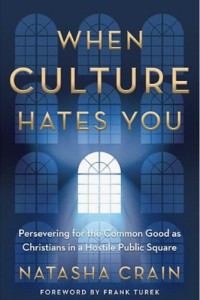Natasha Crain warns Christians in her new book, When Culture Hates You: Persevering for the Common Good as Christians in a Hostile Public Square. She begins by talking about the hostility Christians often face when they articulate a biblical perspective on cultural issues. We shouldn’t be surprised since Jesus warned us, “If the world hates you, know that it has hated me before it hated you” (John 15:18).
 One of the significant criticisms from non-Christians, and even from Christians, is the claim that Christians should not impose their views on others. We also hear that Christians should not seek power. We are told that getting involved in politics harms our witness and can disrupt unity in the church. And we are told that Christians should not be partisans.
One of the significant criticisms from non-Christians, and even from Christians, is the claim that Christians should not impose their views on others. We also hear that Christians should not seek power. We are told that getting involved in politics harms our witness and can disrupt unity in the church. And we are told that Christians should not be partisans.
To evaluate those objections, she proposes slavery as a test case. Here are her five key statements using those objections: (1) Christians shouldn’t have worked to end slavery because we shouldn’t have imposed our views on others. (2) Christians shouldn’t have worked to end slavery because that involved seeking power to do it. (3) Christians shouldn’t have worked to end slavery because getting involved with a political issue harmed our witness. (4) Christians shouldn’t have worked to end slavery because it disrupted unity in the church. (5) Christians shouldn’t have worked to end slavery because Christians shouldn’t have been partisans.
Would we accept those objections today? We would reject such reasoning and can see how we shouldn’t have applied such arguments two centuries ago. We were called to speak truth then and are called to speak truth today.
This blog post originally appeared at pointofview.net/viewpoints/impose-values/ on March 13, 2025.